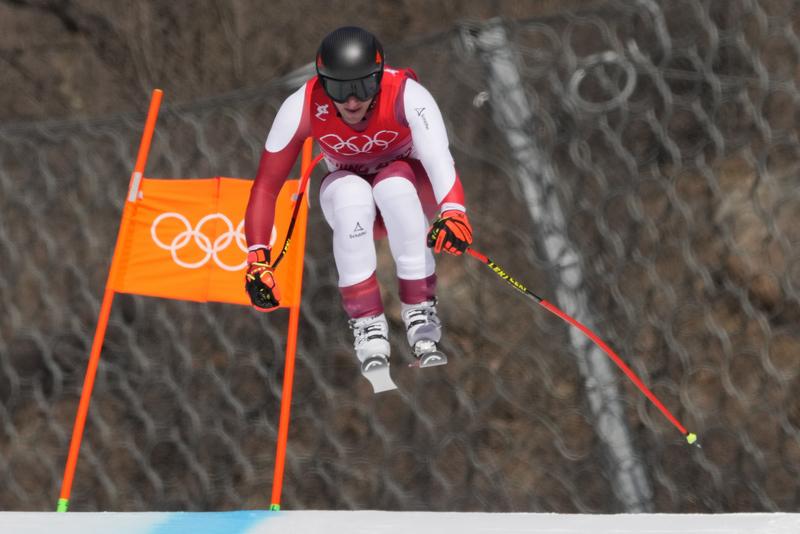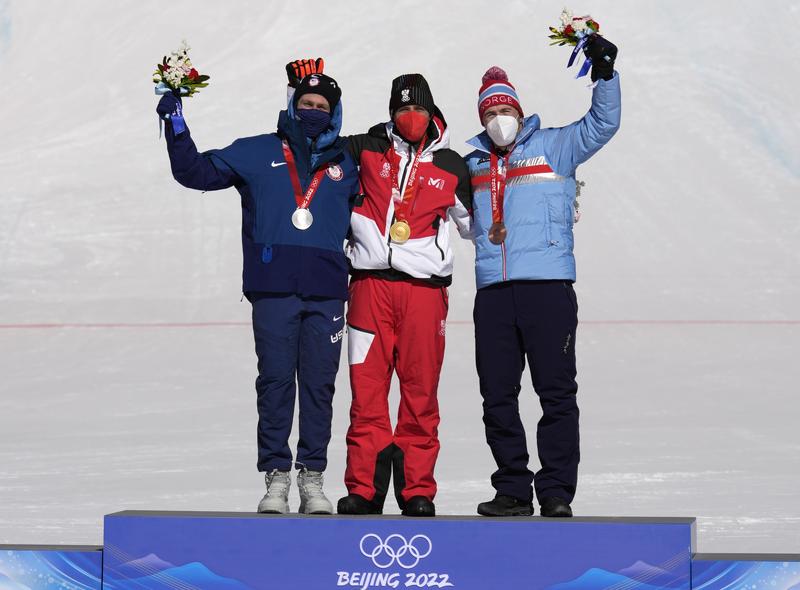 Matthias Mayer, of Austria, makes a jump in the men's downhill at the 2022 Winter Olympics, Feb 7, 2022, in the Yanqing district of Beijing. (DMITRI LOVETSKY / AP)
Matthias Mayer, of Austria, makes a jump in the men's downhill at the 2022 Winter Olympics, Feb 7, 2022, in the Yanqing district of Beijing. (DMITRI LOVETSKY / AP)
YANQING, China - Austria's Matthias Mayer became the first man to win an Alpine skiing gold medal at three consecutive Olympic Games after winning the super-G at the Beijing Games on Tuesday.
Matthias Mayer, who won gold in downhill in Sochi in 2014 and super-G in Pyeongchang four years ago, raced down 'The Rock' in a time of 1:19.94 with American Ryan Cochran-Siegle just four hundredths of a second behind him
Mayer, who won gold in downhill in Sochi in 2014 and super-G in Pyeongchang four years ago, raced down 'The Rock' in a time of 1:19.94 with American Ryan Cochran-Siegle just four hundredths of a second behind him.
Norway's Aleksander Aamodt Kilde, the top ranked skier in both speed disciplines, had to settle for a bronze medal — his first in an Olympics but still a disappointing return after his fifth placed finish in downhill.
Mayer had picked up bronze in Tuesday's downhill but got his hands on gold with a stunning final stage to his run where he made up the decisive time to move ahead of Kilde.
"I tried to push hard, really hard," said Mayer, "I saw Kilde's run on TV at the start and it was really good, so I knew that I had to go all-in.
"I tried to push hard to the last gate, and it was good."
The Austrian found it hard to process his achievement of winning gold at all three Winter Games he has featured in.
"That's such a big success, I can't imagine right now," he said.
READ MORE: Alpine skiing: Sweden's Hector wins thrilling giant slalom
 (From left) Ryan Cochran-Siegle of the United States, silver, Matthias Mayer of Austria, gold, and Aleksander Aamodt Kilde of Norway, bronze, celebrate during the medal ceremony for the men's super-G at the 2022 Winter Olympics, Feb 8, 2022, in the Yanqing district of Beijing. (LUCA BRUNO / AP)
(From left) Ryan Cochran-Siegle of the United States, silver, Matthias Mayer of Austria, gold, and Aleksander Aamodt Kilde of Norway, bronze, celebrate during the medal ceremony for the men's super-G at the 2022 Winter Olympics, Feb 8, 2022, in the Yanqing district of Beijing. (LUCA BRUNO / AP)
Austria men's head coach Sepp Brunner said Mayer had earned his status among the country's all-time greats.
"He is one of the best. Sure Herman (Maier) won more races (in his career) but Matthias is up there with him. He is a superstar now. But he's a good guy, still staying on the ground."
Brenner said Mayer's technique was perfectly suited to the packed, artificial snow of the past two Olympics.
"He likes Olympic snow ... Korea was very similar. He has a lot of feeling for this type of snow.
"He is very strong in his head and that is what you need for these big events," he added.
'Counts for nothing'
Cochran-Siegle has just one career win on the World Cup circuit but threatened to push Mayer into second with an aggressive run that earned him a surprise silver — the United States' first medal in men's Alpine skiing since the 2014 Games in Sochi.
His mother, Barbara Cochran, won gold in slalom in Sapporo in 1972.
"I've heard a lot of advice over the years from my mom that I've been able to channel that and it added up to today," said the American.
"You have to be dialed with everything and you have to mentally be able to go out there and push."
While Mayer's performance over three Games is unmatched in men's racing, in women's skiing Italy's Deborah Compagnoni won Olympic gold in super-G in 1992 and giant slalom in 1994 and 1998.
Mayer also became the first skier, male or female, to win gold in three successive Olympics purely in speed events.
ALSO READ: Freestyle skiing: China's Gu takes historic women's big air gold
His three golds take him level with Toni Sailer in Austria's list of Olympic winners in Alpine skiing.
Switzerland's Marco Odermatt, the overall World Cup leader, skied out of the race, leaving him still without a medal after his seventh place in downhill.
"It's the Olympic Games, just the medal counts so maybe you are taking a little bit more risk than usual," he said. "In the World Cup usually fourth, fifth place are some important points, here it counts for nothing."


